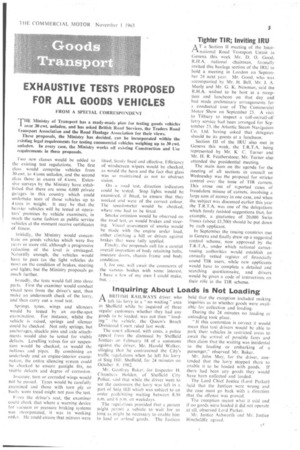Inquiring About Loads is Not Loading
Page 7

If you've noticed an error in this article please click here to report it so we can fix it.
I—I A BRITISH RAILWAYS driver who
left his lorry in a " no waiting" area in Sheffield while he inquired of three regular customers whether they had ally goods to be loaded, was not then " loading " the vehicle, the Queen's Bench Divisional Court ruled last week.
The court allowed, with costs, a police appeal from the dismissal by Sheffield Justices on February 18 of a summons against the driver, Mr. Harold Walker, alleging that he contravened the City's traffic regulations when he left his lorry at Snig Hill. Sheffield, for 24 minutes on October 8. 1962.
Mr. Geoffrey Baker, for inspect(); H. Chambers Holden, of Sheffield City Police, said that while the driver went to see the cusloiners the lorry was left in a part of Silly Hill which was subject to an order prohibiting waiting between 8.30 a.m. and 6 p.m. on weekdays.
The regulations provided that a person might permit a vehicle to wait for so long as might he necessary to enable him to load or unload goods. The Justices held that the exception included making inquiries as to whether goods were available for collection and loading.
During the 24 minutes no loading or unloading took place.
If this contention is correct it would mean that taxi drivers would be able to park their vehicles in restricted areas to await the arrival of possible fares and then claim that the waiting was incidental to the loading or embarking of a passenger," observed Mr. Baker.
Mr. John May, for the driver, contended that the lorry stopped there to enable it to be loaded with goods. If there had been any goods they would have been collected and loaded.
The Lord Chief Justice (Lord Parker) held that the Justices were wrong and the case mist go back with a direction that the offence was proved.
The exception meant what it said arid if no goods were loaded it did not operate at all, observed Lord Parker.
Mr. Justice Ashworth and Mr. Justice Hinchcliffe agreed.




































































































